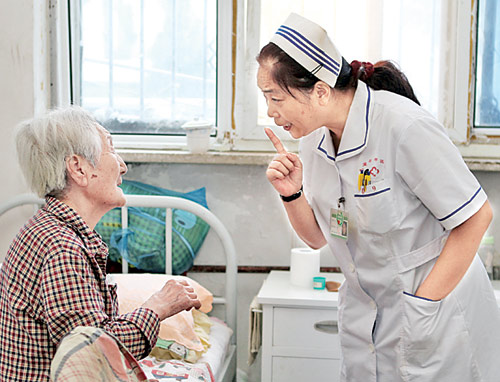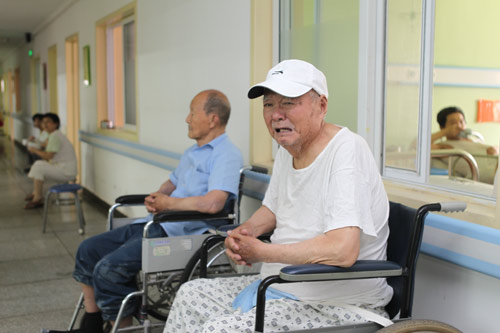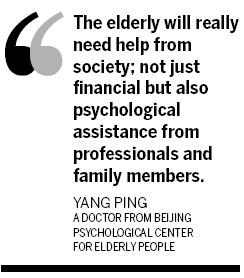Focus
Forgotten folks need love and support from children
By Yang Wanli (China Daily)
Updated: 2010-07-02 10:44
 |
Large Medium Small |
There is nothing so natural as children leaving the nest when they find a job or get a place at university, but that doesn't make it any easier for the parents.
Far from concerns about their children's safety is a much more pressing matter - intense loneliness felt by mom and dad, sadly labeled as the "empty nesters".
|
 |
|
An empty nester chats with a nurse at the Songtang Hospice in the capital. [Photos by Wang Jing / China Daily] |
"I am so lonely. My wife passed away seven years ago and my daughter, who now lives in the United States, can only come back twice a year. I feel forgotten," said Wang Zhong, 62, a retired college teacher living in Changying in Chaoyang district.
Wang said life was more tolerable when he was working, but retirement brought it to a grinding halt.
"The sudden change was hard to accept," he said.
Wang is among an estimated 500,000 "empty nesters" in Beijing.
A recent survey by several Beijing-based medias on 5,000 people in a similar situation in the capital revealed that more than 60 percent described themselves as "lonely".
"The rapidly expanding number of elderly people will become a major social issue," said Wu Shimin, director of the Beijing Aging Committee.
Statistics from the committee showed the annual increase in the elderly was 2.5 percent in the 1980s.
More than 20 years of accelerated growth in the city however has accumulated about 2.5 million people aged over 60, accounting for some 17 percent of the total population.
That figure will continue to climb, to 3.5 million by 2020 and then 6.5 million by 2050.
And with the increase will be a spur in "empty nesters", made likely by improved living conditions and higher salaries that encourage young people to leave home and move into their own apartments.
"The elderly will really need help from society; not just financial but also psychological assistance from professionals and family members," said Yang Ping, a doctor from Beijing Psychological Center for Elderly People.
The center set up a hotline in April 2007, to provide a free and daily consultation service to elderly people. It receives about 3,000 calls annually and also arranges face-to-face meetings in communities.
|
 |
|
Giving encouragement to the elderly is necessary, but quite a challenge. [China Daily] |
"Our operators are trained by medical professionals. However, while they are skilled in providing advice, we still believe that the best way to counter depression is when the family takes an active role," Yang said.
She said most senior citizens' feelings of insecurity could not be resolved by the hotline. Instead, a loving attitude from children, sometimes even just a phone call, can make a dramatic difference.
"They should also get outside and take part in social activities," said a retired worker surnamed Zhang in Huilongguan, Changping district.
He leads an elderly people's modeling club. They hold regular training programs on the weekends and also give occasional performances of fashion shows.
"My advice is to do whatever makes you happy. The best way to end loneliness is to replace it with something else, perhaps a hobby," he said.
The municipal government and the Beijing Aging Committee launched a joint project last year to improve the lives of the elderly. More than 40,000 elderly residents were given emergency response buttons, linked directly to neighboring clinics.
Beijing has about 300 nursing homes and 2,300 senior citizens' activities centers.
And Dongzhimen went one step further by opening a special street for the elderly on June 29. Restaurants, hairdressers and dry cleaners were just some of the shops intended to make life easier for local seniors.
"All 12 stores will provide special services to seniors, at discount prices. The clinics can provide traditional Chinese treatment," said Zhao Chenjie, an official from the Dongzhimen neighborhood office.
But it is not just access to material goods that will benefit them.
Zhu Lin, a doctor at Beijing-based Songtang Hospice, said giving encouragement to the elderly is necessary, but quite a challenge.
Songtang Hospice, which cares for both the elderly and terminally ill patients, has access to hundreds of volunteers.
"However, it is really hard to provoke a positive attitude among the elderly unless the helper has professional training," he said.
Zhu said that while the volunteers might not help the elderly much in psychological issues, it is usually an eye opener for their own lives.